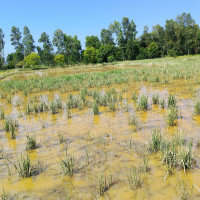- Monday, 13 October 2025
Farmers in Africa say their soil is dying
Nairobi, Kenya, July 25: When Benson Wanjala started farming in his western Kenya village two and a half decades ago, his 10-acre farm could produce a bountiful harvest of 200 bags of maize. That has dwindled to 30. He says his once fertile soil has become a nearly lifeless field that no longer earns him a living.
Like many other farmers, he blames acidifying fertilizers pushed in Kenya and other African countries in recent years. He said he started using the fertilizers to boost his yield and it worked — until it didn't. Kenya's government first introduced a fertilizer subsidy in 2008, making chemical fertilizers more accessible for smaller-scale farmers.
About 63% of arable land in Kenya is now acidic, according to the agriculture ministry, which has been recording a decline in production of staples such as maize and leading exports of horticulture and tea. The production of maize declined by 4% to 44 million tons in 2022, according to the Food and Agriculture Organization, which didn't say why.
The agriculture ministry didn't respond to questions, especially after a scandal over fake fertilizer in April. The fertilizer was found to be quarry dirt in misleadingly labelled bags that were distributed to farmers through a national subsidy program. President William Ruto said about 7,000 farmers bought the fake fertilizer and would be compensated with the correct product.
Problems with soil health are growing as the African continent struggles to feed itself. Africa has 65% of the world’s remaining uncultivated arable land but has spent about $60 billion annually to import food, according to the African Development Bank. The spending is estimated to jump to $110 billion by 2025 due to increased demand and changing consumption habits.
In May, Kenya hosted an Africa-wide soil health summit to discuss declining production, climate change and other issues that have increased food security concerns. Agriculture is a key part of the economy in Kenya, making up more than a quarter of the GDP.
At the summit, Stephen Muchiri, executive director of the Eastern Africa Farmers Federation, advocated for a return to traditional farming practices to replenish lifeless soils, including planting a variety of crops and doing as little as possible to disturb the land.
“Inorganic fertilizers were never meant to be the foundation of crop production," he said, later adding that because of "commercially inclined farming, our soils are now poor, acidic, and low in biomass resources, and without life!”
He said farmers should rotate crops on their land and source compost material from livestock such as goats: “There must be some kind of transition and adaptation for our soils to revert back to fertility."
Experts say soil acidity causes land degradation by decreasing the availability of plant and essential nutrients, making soil more vulnerable to structure decline and erosion.
The program coordinator for the Alliance for Food Sovereignty in Africa, Bridget Mugambe, advised the phasing out of chemical fertilizers.
“Soil health goes beyond the quick fixes provided by chemical fertilizers. In fact, chemical fertilizers have extensively damaged our soils in Africa. We need to think of our soils in a more holistic way," she said.
The soil health summit by the African Union — which in 2006 recommended that members use more chemical fertilizers — adopted a 10-year plan that calls for increased investment to produce both organic and chemical fertilizers locally and triple their use for increased production. (AP)

















